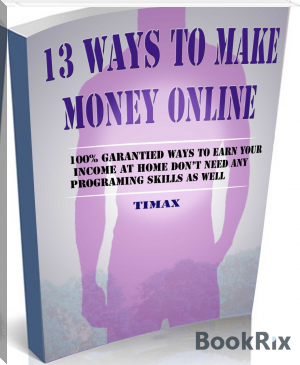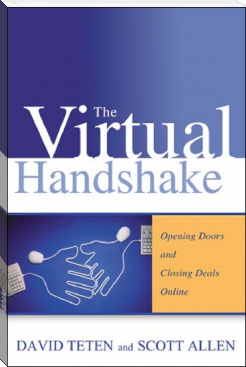Speeches by James Clear, Wolves Forever (ebook reader online TXT) 📖

- Author: James Clear, Wolves Forever
Book online «Speeches by James Clear, Wolves Forever (ebook reader online TXT) 📖». Author James Clear, Wolves Forever
I got the idea to start Amazon 16 years ago. I came across the fact that Web usage was growing at 2,300 percent per year. I’d never seen or heard of anything that grew that fast, and the idea of building an online bookstore with millions of titles — something that simply couldn’t exist in the physical world — was very exciting to me. I had just turned 30 years old, and I’d been married for a year. I told my wife MacKenzie that I wanted to quit my job and go do this crazy thing that probably wouldn’t work since most startups don’t, and I wasn’t sure what would happen after that. MacKenzie (also a Princeton grad and sitting here in the second row) told me I should go for it. As a young boy, I’d been a garage inventor. I’d invented an automatic gate closer out of cement-filled tires, a solar cooker that didn’t work very well out of an umbrella and tinfoil, baking-pan alarms to entrap my siblings. I’d always wanted to be an inventor, and she wanted me to follow my passion.
I was working at a financial firm in New York City with a bunch of very smart people, and I had a brilliant boss that I much admired. I went to my boss and told him I wanted to start a company selling books on the Internet. He took me on a long walk in Central Park, listened carefully to me, and finally said, “That sounds like a really good idea, but it would be an even better idea for someone who didn’t already have a good job.” That logic made some sense to me, and he convinced me to think about it for 48 hours before making a final decision. Seen in that light, it really was a difficult choice, but ultimately, I decided I had to give it a shot. I didn’t think I’d regret trying and failing. And I suspected I would always be haunted by a decision to not try at all. After much consideration, I took the less safe path to follow my passion, and I’m proud of that choice.
Tomorrow, in a very real sense, your life — the life you author from scratch on your own — begins.
How will you use your gifts? What choices will you make?
Will inertia be your guide, or will you follow your passions?
Will you follow dogma, or will you be original?
Will you choose a life of ease, or a life of service and adventure?
Will you wilt under criticism, or will you follow your convictions?
Will you bluff it out when you’re wrong, or will you apologize?
Will you guard your heart against rejection, or will you act when you fall in love?
Will you play it safe, or will you be a little bit swashbuckling?
When it’s tough, will you give up, or will you be relentless?
Will you be a cynic, or will you be a builder?
Will you be clever at the expense of others, or will you be kind?
I will hazard a prediction. When you are 80 years old, and in a quiet moment of reflection narrating for only yourself the most personal version of your life story, the telling that will be most compact and meaningful will be the series of choices you have made. In the end, we are our choices. Build yourself a great story. Thank you and good luck!
“Enough” by John C. Bogle
Here’s how I recall the wonderful story that sets the theme for my remarks today: At a party given by a billionaire on Shelter Island, the late Kurt Vonnegut informs his pal, the author Joseph Heller, that their host, a hedge fund manager, had made more money in a single day than Heller had earned from his wildly popular novel Catch 22 over its whole history. Heller responds, “Yes, but I have something he will never have . . . Enough.”
Enough. I was stunned by its simple eloquence, to say nothing of its relevance to some of the vital issues arising in American society today. Many of them revolve around money—yes, money—increasingly, in our “bottom line” society, the Great God of prestige, the Great Measure of the Man (and Woman). So this morning I have the temerity to ask you soon-to-be-minted MBA graduates, most of whom will enter the world of commerce, to consider with me the role of “enough” in business and entrepreneurship in our society, “enough” in the dominant role of the financial system in our economy, and “enough” in the values you will bring to the fields you choose for your careers.
Kurt Vonnegut loved to speak to college students. He believed, if I may paraphrase here, that “we should catch young people before they become CEOs, investment bankers, consultants, and money managers (and especially hedge fund managers), and do our best to poison their minds with humanity.” And in my remarks this morning, I’ll try to poison your minds with a little bit of that humanity.
Over the past two centuries, our nation has moved from being an agricultural economy, to a manufacturing economy, to a service economy, and now to a predominantly financial economy. But our financial economy, by definition, subtracts from the value created by our productive businesses. Think about it: while the owners of business enjoy the dividend yields and earnings growth that our capitalistic system creates, those who play in the financial markets capture those investment gains only after the costs of financial intermediation are deducted. Thus, while investing in American business is a winner’s game, beating the stock market before those costs is a zero-sum game. But after intermediation costs are deducted, beating the market—for all of us as a group—becomes a loser’s game.
Yes, the more that our financial system takes, the less our investors make. Yet the financial field is where the money is made in modern-day America, the breeding ground for the wealthiest of our citizens. (If you made less than $140 million dollars last year, you didn’t make enough to rank among the 25 highest-paid hedge fund managers.) When we add up all those hedge fund fees, all those mutual fund management fees and operating expenses; all those commissions to brokerage firms and fees to financial advisors; investment banking and legal fees for all those mergers and IPOs; and the enormous marketing and advertising expenses entailed in the distribution of financial products, we’re talking about some $500 billion dollars per year. That sum, extracted from whatever returns the stock and bond markets are generous enough to deliver to investors, is surely enough, if you will, to seriously undermine the odds in favor of success for our citizens who are accumulating savings for retirement.
Yet the fact is that the finance sector has become by far our nation’s largest generator of corporate profits, larger even than the combined profits of our huge energy and health care sectors, and almost three times as much as either manufacturing or information technology.For the record, the 2006 operating earnings of the S&P 500 totaled $787 billion. The earnings of the major sectors (in billions) were: Financials $215; Energy $121; Health Care $79; Manufacturing and Technology each $81."> Twenty–five years ago, financials accounted for only about 6 percent of the earnings of the 500 giant corporations that compose the Standard & Poor’s 500 Stock Index. Ten years ago, the financial sector share had risen to 20 percent. And last year, the financial sector profits had soared to an all-time high of 27 percent. If we add the earnings of the financial affiliates of our giant manufacturers (think General Electric Capital, for example, or the auto financing arms of General Motors and Ford) to this total, financial earnings now likely exceed 33 percent of the earnings of the S&P 500. While that share may or may not be enough, it seems likely to continue to grow, at least for a while.
We’re moving, or so it seems, to a world where we’re no longer making anything in this country; we’re merely trading pieces of paper, swapping stocks and bonds back and forth with one another, and paying our financial croupiers a veritable fortune. We’re also adding even more costs by creating ever more complex financial derivatives in which huge and unfathomable risks are being built into our financial system. “When enterprise becomes a mere bubble on a whirlpool of speculation,” as the great British economist John Maynard Keynes warned us 70 years ago, the consequences may be dire. “When the capital development of a country becomes a by-product of the activities of a casino, the job of capitalism is likely to be ill-done.”
Once a profession in which business was subservient, the field of money management and Wall Street has become a business in which the profession is subservient. Harvard Business School Professor Rakesh Khurana was right when he defined the conduct of a true professional with these words: “I will create value for society, rather than extract it.” And yet money management, by definition, extracts value from the returns earned by our business enterprises. Warren Buffett’s wise partner Charlie Munger lays it on the line:
“Most money-making activity contains profoundly antisocial effects . . . As high cost modalities become ever more popular . . . the activity exacerbates the current harmful trend in which ever more of the nation’s ethical young brain-power is attracted into lucrative money-management and its attendant modern frictions, as distinguished from work providing much more value to others.”
But I’m not telling you not to go into the highly-profitable field of managing money. Rather, I present three caveats:
One, if you do enter this field, do so with your eyes wide open, recognizing that any endeavor that extracts value from its clients may, in times more troubled than these, find that it has been hoist by its own petard. It is said on Wall Street, correctly, that “money has no conscience,” but don’t allow that truism to let you ignore your own conscience, nor to alter your own conduct and character. Two, when you begin to invest so that you will have enough for your own retirement many decades hence, do so in a way that minimizes the extraction by the financial community of the returns generated by business. This is, yes, a sort of self servingSelf-serving because I created, in 1975, the world’s first index mutual fund."> recommendation to invest in low-cost all-U.S.—and global—stock market index funds, the only way to guarantee your fair share of whatever returns our financial markets are generous enough to provide. Three, no matter what career you choose, do your best to hold high its traditional professional values, now swiftly eroding, in which serving the client is always the highest priority. And don’t ignore the greater good of your community, your nation, and your world. After William Penn, “we pass through this world but once, so do now any good you can do, and show now any kindness you can show, for we shall not pass this way again.”Most commencement speakers like to sum up by citing some eminent philosopher to endorse his message. I’m no exception. So I now offer to you new Masters of Business Administration these words from Socrates, spoken 2500 years ago, as he challenged the citizens of Athens.
“I honor and love you: but why do you who are citizens of this great





Comments (0)